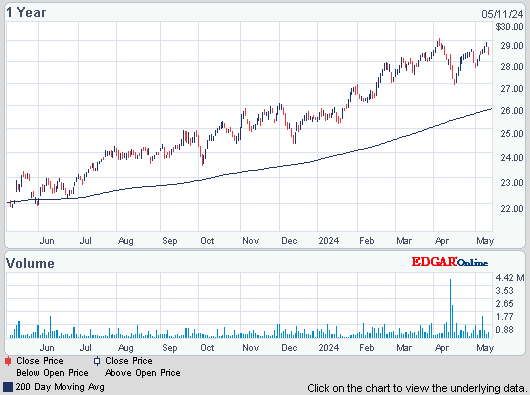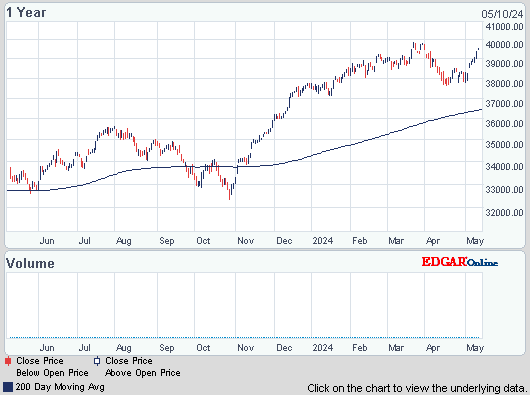Dow finished with a drop of 101 (well off the lows), decliners 3-1 ahead of advancers & NAZ fell 35. The Financial Index fell 1+ to 192. The MLP index dropped 3 to the 397s & the REIT index was off 1+ to 263. The MLP index is close to its record highs & the REIT index is just below its yearly highs. Junk bond funds gained & Treasuries had a very good day, bringing record or near record low yields. Oil had its worst day of the year after a 2 month rally & gold sold off, failing to attract significant buying support from money seeking safe haven investments.

![Live 24 hours gold chart [Kitco Inc.]](http://www.kitco.com/images/live/gold.gif)

"If you look for trouble, you will find it" says the old adage & today, trouble is easy to find. With minimal economic data to divert our eyes, investors have only to glance at a super-heavy earnings calendar that's devoid of any forward-looking optimism, the € is at a 12-year low & record yields on Spanish borrowing costs, to know which way this train is headed. The fear trade is awake & ready to roll, & the hiding places are almost non-existent. McDonald's (MCD) earnings was a bummer. The drama in Europe is escalating again as yields spike & then there's talk of the euro zone collapsing. What's Big Ben to do to solve these problems? There may be an obstacle as he considers whether more bond purchases are needed to spur growth: owning too much. Excessive buying of Treasury securities can reduce liquidity by leaving less for private investors to buy. Bernanke instead may favor buying mortgage-backed securities or using new tools for easing, but purchasing too many Treasuries may have a serious long- term effect on the market. Bernanke is evaluating additional steps to create jobs & reverse an economic slowdown, including buying mortgage bonds or changing language for its policy outlook. We're back to make it up as we go along. Not good.
The US regulator overseeing Fannie Mae, Freddie Mac & the Federal Home Loan Banks has hired a consulting firm to create contingency plans for taking the mortgage-finance firms into receivership. However, it is claimed that the plan is part of “ordinary regulatory activities” & does not indicate that the Federal Housing Finance Agency intends to take the companies or the banks into receivership. Receivership would involve winding down the companies selling off their assets. This is part of what is alled "routine planning." Huh?? They have been operating under US conservatorship since Sep 2008 (Lehman collapse), when investments in risky loans pushed them to the brink of insolvency. Under conservatorship, as opposed to receivership, the 2 taxpayer- owned companies continue to operate while having drawn almost $190B in aid from the Treasury. The fate of Fannie Mae & Freddie Mac is in limbo. Private financing for mortgages evaporated in the aftermath of the 2008 financial crisis, & the 2 companies now own or guarantee about 60% of residential mortgages. Just another massive headache to worry about.
Fannie Mae, Freddie Mac Getting Receivership Contingency Plan

Photo: Bloomberg
US homebuilders are an attractive investment as the housing market starts a “strong” recovery that may drive a surge in new-home sales, according to Goldman Sachs (GS). Housing has a “long list of positives,” including rising prices, job growth, supportive gov policies & a decline in the so-called shadow inventory of homes, Goldman Sachs said. Public homebuilders, which have been taking market share from closely held companies, reported increasing orders this year as mortgage rates fell to record lows & the supply of existing homes for sale shrank. Construction of single-family houses rose 4.7% in Jun to a 539K annual rate, the fastest in 2 years, according to the Commerce Dept. “The super cyclical housing market has turned and a strong recovery in new-home sales is ahead,” Goldman Sachs said. “Over the last year a number of risks to the housing market have abated, giving us confidence that rising home prices will drive a 3-7 year up-cycle in the U.S. market.” The report says the US economy has created enough jobs since the end of the recession in 2009 to fuel new home sales at an annual rate of 550K-600K. The report estimated new-home sales would reach 700K in 2014. A ray of hope on a day dominated by dismal news.
Goldman Sachs Sees ‘Strong’ Recovery Starting for U.S. Housing
The bulls haven't thrown in the towel yet. Asian markets had an ugly day in the overnight session & the US markets began with heavy losses. But buyers returned to limit the losses. However fundamental problems have not gone away. This week intl inspectors will reexamine gov books in Greece, Spain is descending into chaos, Italy has more than its share of economic problems, etc. China has become a big unknown, nobody really knows what's going on there. Earnings reports will keep coming in the US. The big questions are can they match lowered expectations & is anybody brave enough to give an optimistic outlook. Investor darling Apple (AAPL) will report earnings tomorrow. At the opening it plunged 20, but recovered all of that loss during the rest of the day.

AMJ (Alerian MLP Index tracking fund)
Click below for the latest market update:
Treasury yields:
U.S. 3-month | 0.086% | |
U.S. 2-year | 0.210% | |
U.S. 10-year | 1.433% |
| CLU12.NYM | ...Crude Oil Sep 12... | 88.97 | ... | (3.1%) |
![Live 24 hours gold chart [Kitco Inc.]](http://www.kitco.com/images/live/gold.gif)

"If you look for trouble, you will find it" says the old adage & today, trouble is easy to find. With minimal economic data to divert our eyes, investors have only to glance at a super-heavy earnings calendar that's devoid of any forward-looking optimism, the € is at a 12-year low & record yields on Spanish borrowing costs, to know which way this train is headed. The fear trade is awake & ready to roll, & the hiding places are almost non-existent. McDonald's (MCD) earnings was a bummer. The drama in Europe is escalating again as yields spike & then there's talk of the euro zone collapsing. What's Big Ben to do to solve these problems? There may be an obstacle as he considers whether more bond purchases are needed to spur growth: owning too much. Excessive buying of Treasury securities can reduce liquidity by leaving less for private investors to buy. Bernanke instead may favor buying mortgage-backed securities or using new tools for easing, but purchasing too many Treasuries may have a serious long- term effect on the market. Bernanke is evaluating additional steps to create jobs & reverse an economic slowdown, including buying mortgage bonds or changing language for its policy outlook. We're back to make it up as we go along. Not good.
The US regulator overseeing Fannie Mae, Freddie Mac & the Federal Home Loan Banks has hired a consulting firm to create contingency plans for taking the mortgage-finance firms into receivership. However, it is claimed that the plan is part of “ordinary regulatory activities” & does not indicate that the Federal Housing Finance Agency intends to take the companies or the banks into receivership. Receivership would involve winding down the companies selling off their assets. This is part of what is alled "routine planning." Huh?? They have been operating under US conservatorship since Sep 2008 (Lehman collapse), when investments in risky loans pushed them to the brink of insolvency. Under conservatorship, as opposed to receivership, the 2 taxpayer- owned companies continue to operate while having drawn almost $190B in aid from the Treasury. The fate of Fannie Mae & Freddie Mac is in limbo. Private financing for mortgages evaporated in the aftermath of the 2008 financial crisis, & the 2 companies now own or guarantee about 60% of residential mortgages. Just another massive headache to worry about.
Fannie Mae, Freddie Mac Getting Receivership Contingency Plan

US homebuilders are an attractive investment as the housing market starts a “strong” recovery that may drive a surge in new-home sales, according to Goldman Sachs (GS). Housing has a “long list of positives,” including rising prices, job growth, supportive gov policies & a decline in the so-called shadow inventory of homes, Goldman Sachs said. Public homebuilders, which have been taking market share from closely held companies, reported increasing orders this year as mortgage rates fell to record lows & the supply of existing homes for sale shrank. Construction of single-family houses rose 4.7% in Jun to a 539K annual rate, the fastest in 2 years, according to the Commerce Dept. “The super cyclical housing market has turned and a strong recovery in new-home sales is ahead,” Goldman Sachs said. “Over the last year a number of risks to the housing market have abated, giving us confidence that rising home prices will drive a 3-7 year up-cycle in the U.S. market.” The report says the US economy has created enough jobs since the end of the recession in 2009 to fuel new home sales at an annual rate of 550K-600K. The report estimated new-home sales would reach 700K in 2014. A ray of hope on a day dominated by dismal news.
Goldman Sachs Sees ‘Strong’ Recovery Starting for U.S. Housing
The bulls haven't thrown in the towel yet. Asian markets had an ugly day in the overnight session & the US markets began with heavy losses. But buyers returned to limit the losses. However fundamental problems have not gone away. This week intl inspectors will reexamine gov books in Greece, Spain is descending into chaos, Italy has more than its share of economic problems, etc. China has become a big unknown, nobody really knows what's going on there. Earnings reports will keep coming in the US. The big questions are can they match lowered expectations & is anybody brave enough to give an optimistic outlook. Investor darling Apple (AAPL) will report earnings tomorrow. At the opening it plunged 20, but recovered all of that loss during the rest of the day.
Dow Jones Industrials
Get your favorite symbols' Trend Analysis TODAY!


No comments:
Post a Comment